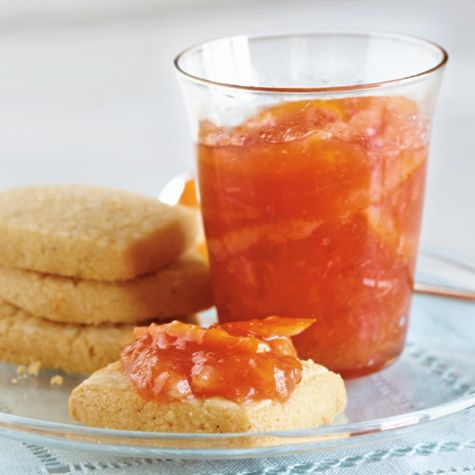
Blood Orange Marmalade
Blood oranges are in season only briefly, so make this recipe before they are gone. Their sweet-tart juice and slightly bitter peel are ideal for marmalade. Use a mandoline, if possible, to slice the oranges thinly. Do not overcook the marmalade or it will have a caramel flavor.
Ingredients:
- 2 lb. blood oranges
- About 6 cups sugar, or as needed
- 2 cups fresh blood orange juice
- 1/2 cup fresh lemon juice
Directions:
Have ready 7 hot, sterilized half-pint jars and their lids. Place 2 or 3 small plates in the freezer.
Cut the stem ends off each orange. Slice each orange as thinly as possible, preferably on a mandoline. Place the slices in a large nonreactive saucepan and add 8 cups water. Set over medium-high heat and bring to a boil. Cook, uncovered, stirring frequently, for 15 minutes. Remove from the heat and let cool slightly.
Measure the orange slices and their liquid and return to the pan. For each 1 cup, add 3/4 cup sugar. Stir in the orange juice and lemon juice. Set over medium-high heat and bring to a boil, then boil rapidly for 10 minutes. Reduce the heat to medium and cook, stirring frequently, until the mixture is slightly thickened and gelatinous, 7 to 10 minutes more. Remove from the heat. To test if the marmalade is ready, put 1 tsp. of the marmalade on a chilled plate and place in the freezer for 2 minutes. The marmalade is ready if it wrinkles when nudged gently with a finger. If it doesn’t, continue to cook for 1 to 2 minutes more, remove from the heat and test again on a clean chilled plate.
Ladle the hot marmalade into the jars, leaving 1/4 inch of headspace. Remove any air bubbles and adjust the headspace, if necessary. Wipe the rims clean and seal tightly with the lids.
Process the jars in a boiling-water bath for 10 minutes. The sealed jars can be stored in a cool, dark place for up to 1 year. If a seal has failed, store the jar in the refrigerator for up to 1 month. Makes 7 half-pint jars.
Adapted from The Art of Preserving, by Lisa Atwood, Rebecca Courchesne & Rick Field (Weldon Owen, 2010).








